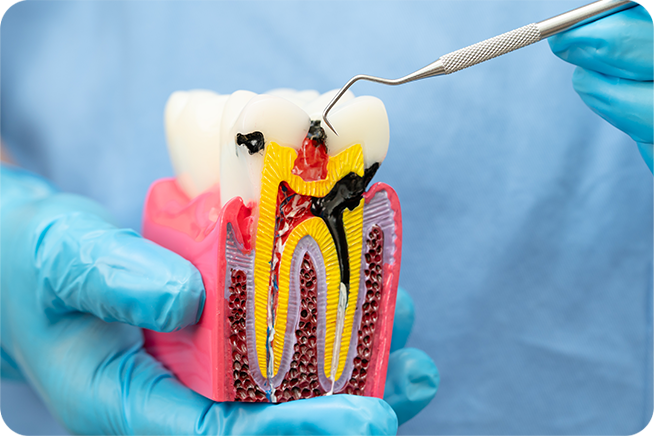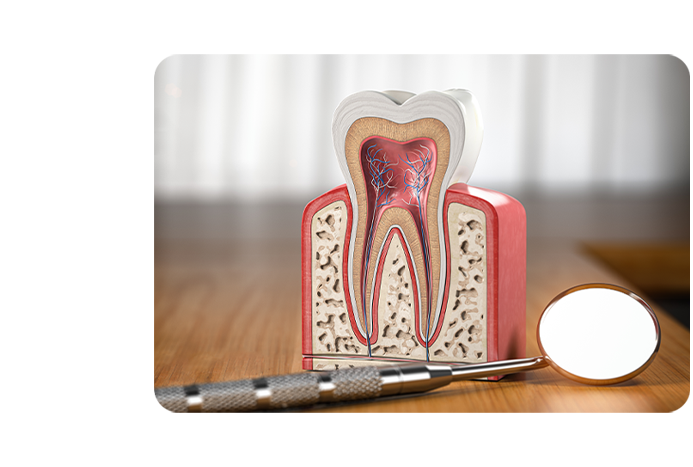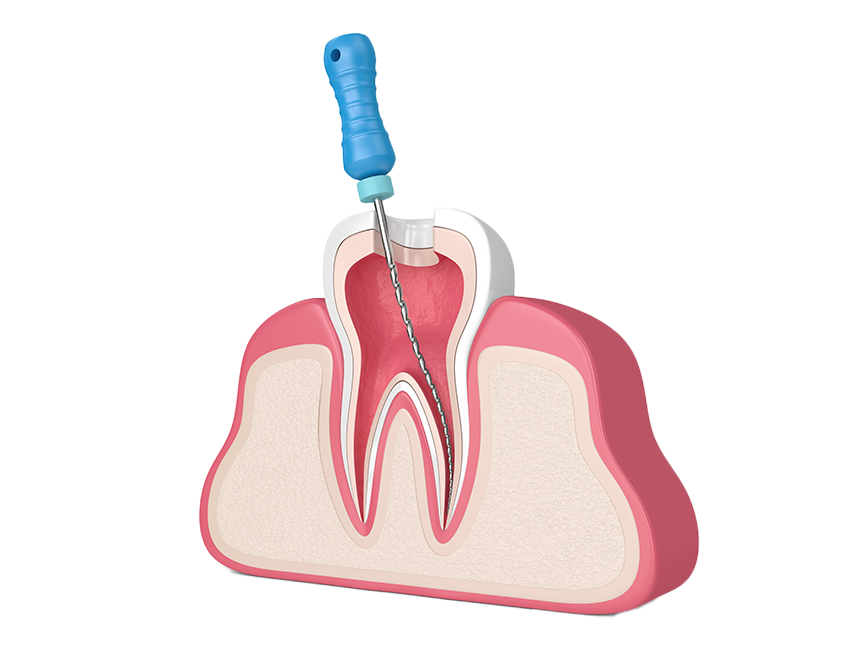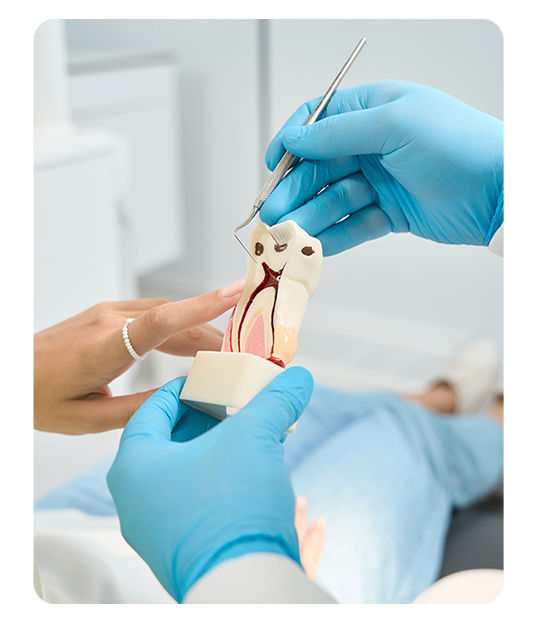Root Canal Treatment
An Effective Way to Protect Your Dental Health
Root canal treatment is a procedure designed to repair significant damage to the internal structure of a tooth and preserve it without extraction. When the tooth nerves become inflamed or infected, this treatment alleviates pain, maintains the tooth's function, and ensures long-term oral health. Root canal therapy is one of the most effective solutions to save a tooth before it needs to be removed. In this article, we will explore what root canal treatment is, why it’s necessary, how it’s performed, and what care is needed afterward.

What Is Root Canal Treatment?
🦷 Why Is Root Canal Treatment Necessary?
Root canal treatment involves the removal of the pulp tissue, which contains nerves and blood vessels, when it becomes inflamed or damaged. The pulp is a vital part of the tooth that supplies nutrients and oxygen to the tooth. However, it can become infected due to deep cavities, dental trauma, or repeated dental treatments.
When the pulp becomes infected, it can cause severe pain, sensitivity, and ultimately lead to tooth loss. Through root canal treatment, this damaged tissue is cleaned, and the tooth is preserved while the pain is eliminated. If left untreated, the infection can spread to the jawbone, leading to more serious health issues.
Conditions That Require Root Canal Treatment
🦷 When Is Root Canal Treatment Recommended?
- Deep Cavities: When decay extends past the enamel and dentin into the pulp tissue, infection can develop.
- Dental Trauma: A strong blow to the tooth can damage the nerve tissue, causing inflammation.
- Repeated Dental Procedures: Past fillings or crowns can lead to pulp inflammation over time.
- Cavities Under Fillings: If decay progresses beneath old fillings, it may reach the tooth nerve and necessitate root canal treatment.
- Tooth Abscess: Abscesses at the root of the tooth can be cleared with root canal therapy.
It's essential to consult a dentist for early intervention if any of these conditions are present.


Signs You May Need a Root Canal
🦷 Common Symptoms Indicating the Need for Root Canal Treatment
- Severe tooth pain or sensitivity
- Prolonged sensitivity to hot or cold foods
- Discomfort or pain when chewing
- Swelling or abscess formation in the gums
- Darkening or discoloration of the tooth
If any of these signs occur, it’s crucial to see a dentist promptly. Early diagnosis leads to easier and faster treatment.
How is Root Canal Treatment Performed?
🦷 How Is Root Canal Treatment Performed?
Root canal treatment typically takes one or two sessions. The process includes the following steps:
- Examination and Diagnosis: The dentist takes X-rays to assess the condition of the tooth and its roots.
- Anesthesia: Local anesthesia is applied to ensure that no pain is felt during the procedure.
- Pulp Cleaning: A small hole is made in the tooth’s top, and the infected pulp tissue is removed.
- Cleaning the Root Canals: Specialized instruments are used to clean, disinfect, and remove any remaining bacteria from the root canals.
- Filling the Canals: The cleaned root canals are filled with a biocompatible material to prevent future infections.
- Permanent Filling or Crown: The tooth is sealed with a filling or crown to restore its strength and durability.
After the treatment is completed, the tooth can continue to function normally.


Post-Treatment Care for Root Canal Patients
🦷 Aftercare for Root Canal Treatment
To maintain dental health after a root canal, the following guidelines should be observed:
- Mild pain or sensitivity may occur for a few days after the procedure.
- Painkillers prescribed by your dentist can be taken to manage any discomfort.
- Avoid hard or difficult-to-chew foods for a few days after the procedure.
- Practice good oral hygiene by brushing your teeth regularly and using dental floss.
- If a crown or cap is needed, it should be applied within the time frame recommended by your dentist.
- Regular dental check-ups should be maintained to ensure long-term dental health.
Proper aftercare ensures the treated tooth remains healthy for many years.
Frequently Asked Questions About Root Canal Treatment
🦷 Frequently Asked Questions about Root Canal Treatment
- Is root canal treatment painful?
Local anesthesia ensures there is no pain during the procedure. Some mild sensitivity may occur afterward, but this usually subsides within a few days. - How long does root canal treatment take?
The duration of treatment depends on the condition of the tooth. Simple cases can typically be completed in one session, while more complex cases may require multiple visits. - How durable is a tooth treated with a root canal?
With proper care and regular check-ups, a root canal-treated tooth can last for many years. A crown may be recommended to further enhance the tooth’s durability. - Should I choose root canal treatment or tooth extraction?
Root canal treatment is generally a better option than tooth extraction as it preserves the natural tooth structure. Extraction may require replacements such as implants or bridges, which are more invasive and expensive.


Safe and Effective Root Canal Treatment at LHC Clinic
🦷 At LHC Clinic, we are committed to preserving your dental health using the most advanced root canal techniques. Our expert dentists use the latest methods to ensure your root canal treatment is performed efficiently and without pain.
Don’t neglect your dental health! Visit LHC Clinic for regular check-ups and to maintain healthy, long-lasting teeth.
Frequently Asked Questions
Numbness from local anesthesia typically fades within 2 to 4 hours after the procedure.
Factors affecting this include:
• The type of anesthetic used• The area treated
• Individual body response
Tip:
Avoid chewing or drinking hot liquids until sensation fully returns to prevent accidental
injury.
Why Are Color, Shape, and Symmetry Harmony Important in Dental Aesthetics? In smile design, achieving harmony in color, shape, and symmetry is key to creating a natural, balanced appearance. Discrepancies can make even healthy teeth look unattractive. Factors considered: • Matching the veneers or crowns to the natural tooth color and shape • Ensuring proportionate tooth sizes relative to facial features • Aligning teeth for overall symmetry This careful planning ensures the smile enhances the patient’s overall facial aesthetics.
Tartar (calculus) is hardened plaque that cannot be removed by brushing alone. It
accumulates along the gumline and between teeth.
Treatment:
• Professional scaling and cleaning are required to remove tartar
• Regular cleanings help prevent its buildup
Preventing tartar starts with daily brushing, flossing, and routine dental visits.
Effects of Smoking on Oral and Dental Health Smoking adversely affects oral health by: • Increasing the risk of gum disease • Delaying healing after dental procedures • Causing bad breath and staining teeth • Elevating oral cancer risk Quitting smoking improves oral health and the success of dental treatments.
Proper care after extraction helps prevent complications:
• Keep the gauze pad in place and bite down gently to stop bleeding
• Avoid spitting, rinsing forcefully, or using straws for the first 24 hours• Refrain from smoking as it hinders healing
• Eat soft, cool foods and avoid the extraction site while brushing
Sticking to these precautions promotes healing and prevents conditions like dry socket.
